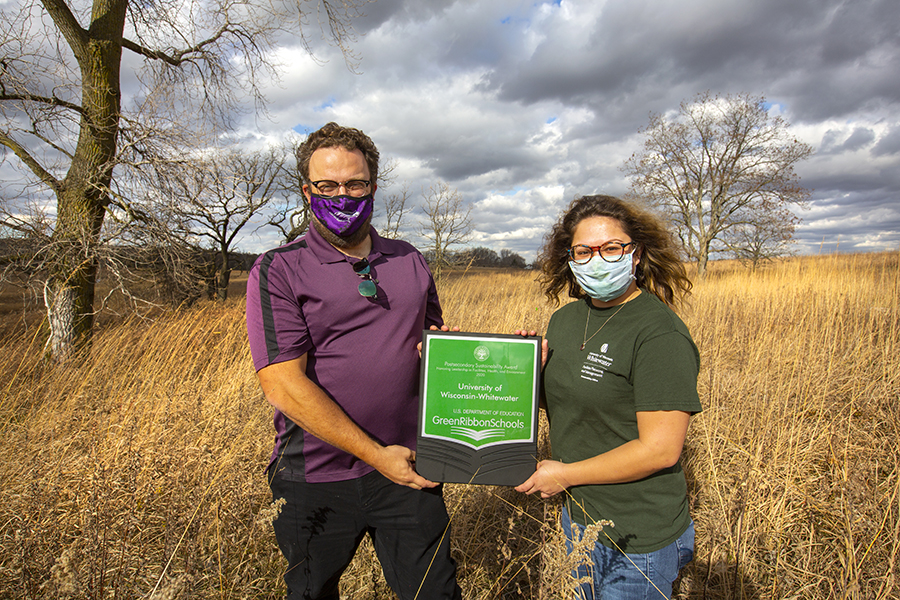
UW-Whitewater Sustainability director Wes Enterline, left, and assistant coordinator Ashley Flor show the Green Ribbon Schools plaque awarded to the university by the U.S. Department of Education. The award honors leadership in facilities, health and environment on the campus. (UW-Whitewater photo/Craig Schreiner)
The U.S. Department of Education has named the University of Wisconsin-Whitewater a Green Ribbon School, one of only five colleges nationwide to be so designated in 2020.
The award is based on “three pillars” of the green school philosophy, with honorees demonstrating progress in reducing environmental impacts, such as waste, water, energy, greenhouse gases, and transportation in the areas of facilities, grounds, and operations; improving health and wellness through coordinated school health, with consideration to air quality, contaminant control, acoustics, daylighting, thermal comfort, school nutrition, and outdoors physical activity; and offering effective environmental and sustainability education that emphasizes hands-on, real-world learning, civic engagement, STEM connections, and green career preparation.
UW-Whitewater will celebrate the national award with a virtual ceremony held at 10 a.m. Thursday, Nov. 12, with University of Wisconsin System President Tommy Thompson and UW-Whitewater Chancellor Dwight C. Watson offering remarks.
“UW-Whitewater strives to embody the Wisconsin Idea, with collaborative learning opportunities that thrive within, and outside of, the classroom,” said Chancellor Watson. “I am proud of the efforts of our sustainability team as well as the many efforts across campus to reduce environmental impacts, improve health and wellness, and offer environmental and sustainability education.”
Award recipients are normally invited to a summer ceremony in Washington, D.C., where they receive a sustainability plaque. Due to the COVID-19 pandemic, the ceremony was canceled and the plaque was mailed to campus. Wes Enterline, UW-Whitewater’s sustainability director, said the goal of applying for the accolade was to bring awareness to the many sustainability efforts across campus, spanning many departments and academic disciplines.
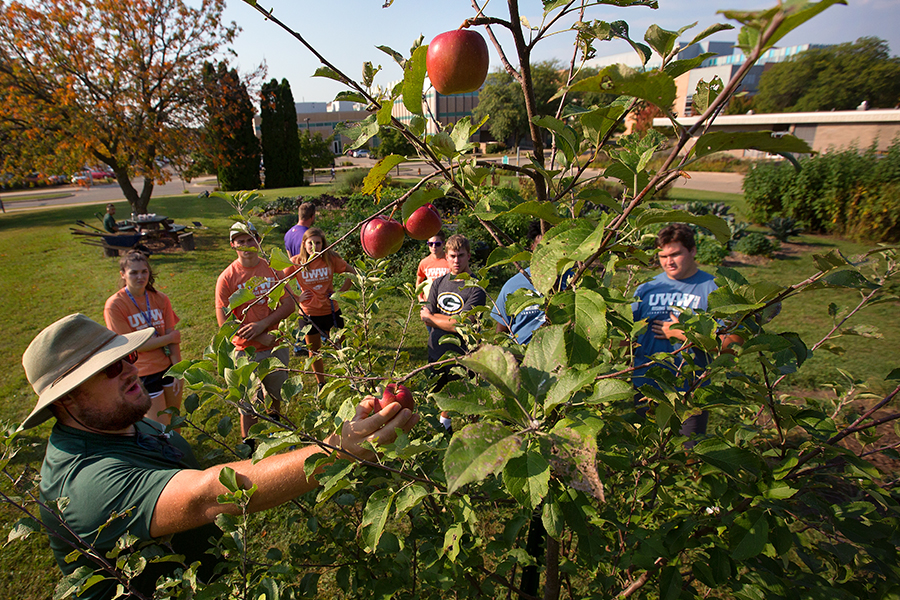 |
| Sustainability Director Wes Enterline, left, conducts a tour of the Campus Garden for learning community students on Friday, Sept. 15, 2017. |
“Many of those efforts are visible and easy to recognize, like our Monarch Waystation in the Campus Prairie or the water bottle fillers installed in water fountains across campus,” said Enterline. “But one of the pillars the award is based on emphasizes improving health and wellness — something we don’t always think of when it comes to sustainability. In fact, sustaining ourselves is key to being sustainable as an institution, and the fact that this award recognizes that shows how well-rounded the criteria are.”
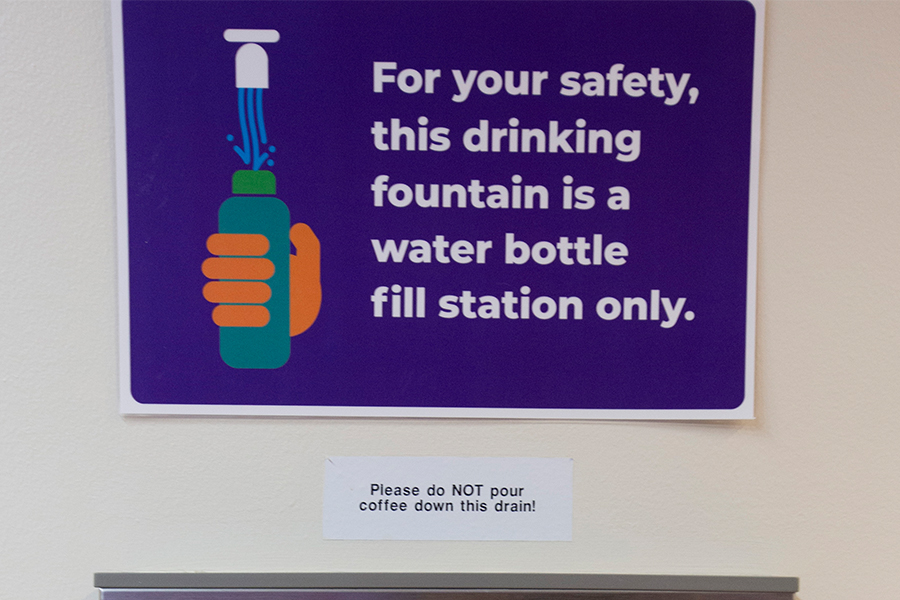 |
| More than 100 water bottle fillers are installed in water fountains across campus, including in academic buildings, residence halls and common spaces. |
Enterline became the first coordinator of the university’s sustainability efforts shortly after graduating from UW-Whitewater with a B.S. in sociology and a minor in environmental studies in 2008, after first earning a BBA in computer–end user technology in 2002. Early initiatives of the office included establishing the Campus Garden, which occupies a half-acre lot next to the Ambrose Health Center and produces about 2,000 pounds of food a year, more than 10,000 pounds of which has been donated to area food pantries since 2013.
Enterline also stresses the importance of colleagues across campus who partner with the Sustainability Office to promote green initiatives, reduce waste or introduce environmental issues into academic programs. He cites Eric Compas, professor of geology, geography and environmental science, who he says “not only guided me as a nontraditional student by challenging our class to conduct the first greenhouse gas inventory of the entire Whitewater campus in 2008, but is a consistent voice of advocacy for environmental issues on campus and beyond.” He also highlights Frank Bartlett, director of University Housing, who helped establish the first sustainability position and continues to participate in finding innovative solutions with a sustainability mindset.
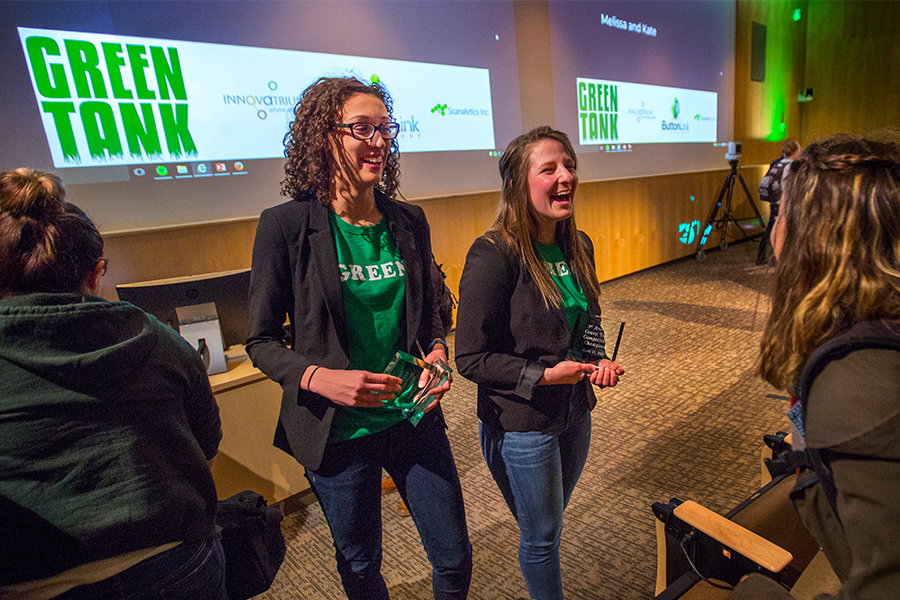 |
| UW-Whitewater business students Melissa Khalil, left, and Kaitlin Amerling are congratulated on their first-place win in the Green Tank business plan competition for Earth Week on April 11, 2018. The annual event is a collaboration of the university’s American Marketing Association chapter and the UW-Whitewater Earth Initiative, which the sustainability office directs. |
Another critical source of the success of the team’s sustainability initiatives has been the involvement of student interns over the years, who learn tangible skills including time and project management, organization, interpersonal communication and independent research and analysis that can be applicable to a wide range of future careers.
Emily Peters, a biology major from Sussex, has been involved in establishing a Monarch Waystation in the campus Nature Preserve. Peters Emily led the effort to win a Monarch Waystation designation for the prairie from Monarch Watch, a nonprofit organization dedicated to education, conservation and research for the monarch butterfly and other pollinators. To earn the designation, she applied for a grant and won a contribution of several hundred plants representing a $1,000 in-kind donation to the university.
“Because of the size of our prairie, we were able to get 400 milkweed plants,” said Peters, who coordinated the planting and marking of the plants.
In the summer of 2020, Peters was able to secure an internship with the Wisconsin Department of Natural Resources.
“While at the DNR, I was lucky enough to see beautiful high-quality remnant prairies in the Walworth County area, some even right outside of Whitewater. Seeing these remnant areas so close by has helped to get a better understanding of what our nature preserve could become with the regular care and restoration efforts it has been receiving over the years.”
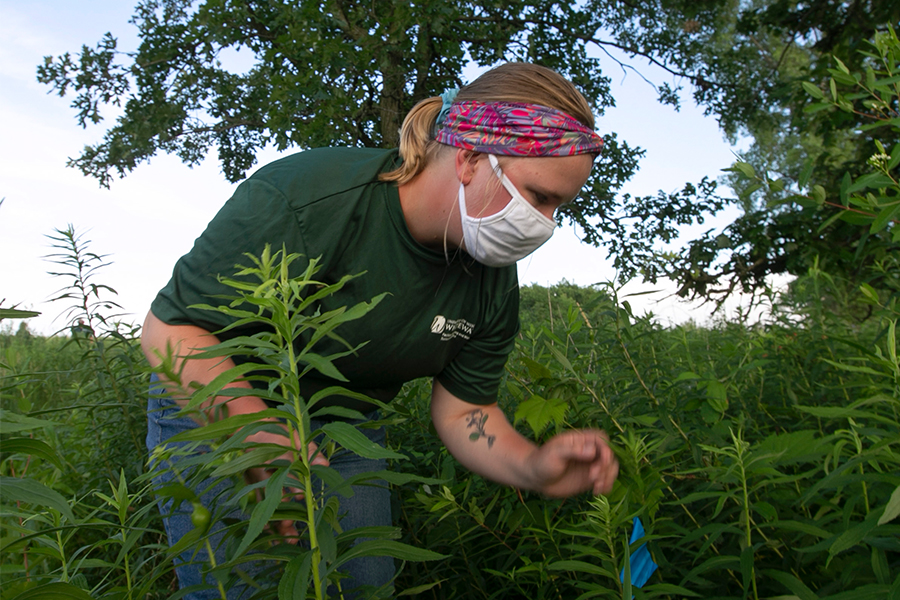 |
| UW-Whitewater student Emily Peters, a biology major from Sussex, checks one of 400 milkweed plants from a grant she coordinated with Monarch Watch in the prairie of the UW-Whitewater Nature Preserve on July 8, 2020. |
“Emily is a great example of the value of having an active sustainability program that promotes and supports having a space for students to learn more about resource utilization, environmental protection, reduction of waste, and how to live and thrive as responsible and engaged citizens today and beyond graduation day,” said Enterline.
“The real impact of sustainability projects is when these practices are implemented and embraced by the entire campus community. Then we start to fulfill the role of our university as a steward of natural and financial resources in the best interests of our students’ futures.”
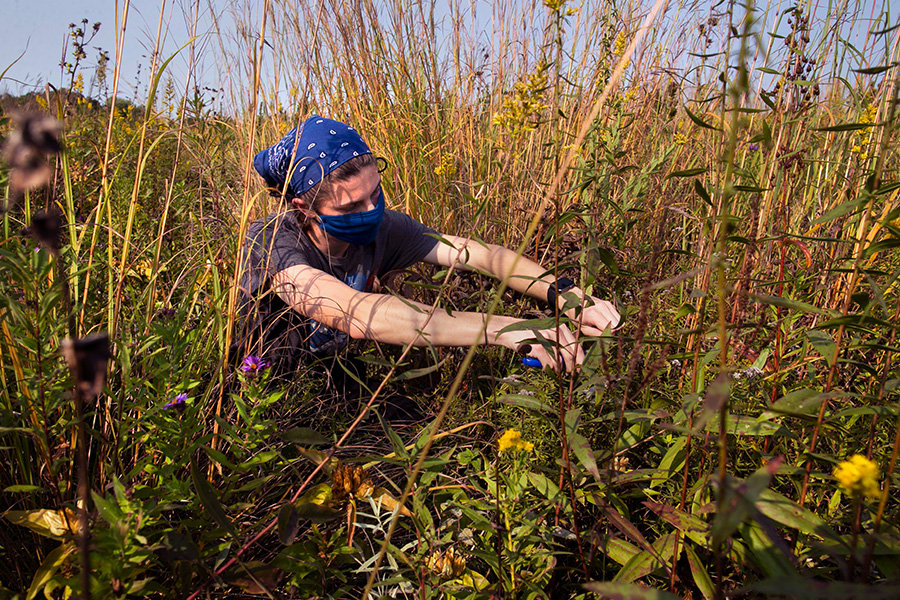 |
| Will Corrado, a general business major from Elmhurst, Illinois, gathered seed in the campus prairie on Monday, Sept. 21, 2020. Every year, student volunteers pull, clip and snap the seed heads from flowers and grasses to continue the prairie restoration effort by UW-Whitewater Sustainability. |
Ashley Flor (pictured top photo, with Enterline), who earned a BBA in marketing in 2017 and has worked with the Sustainability Office for five years, will soon begin a new position as a conservation programs assistant with The Nature Conservancy.
